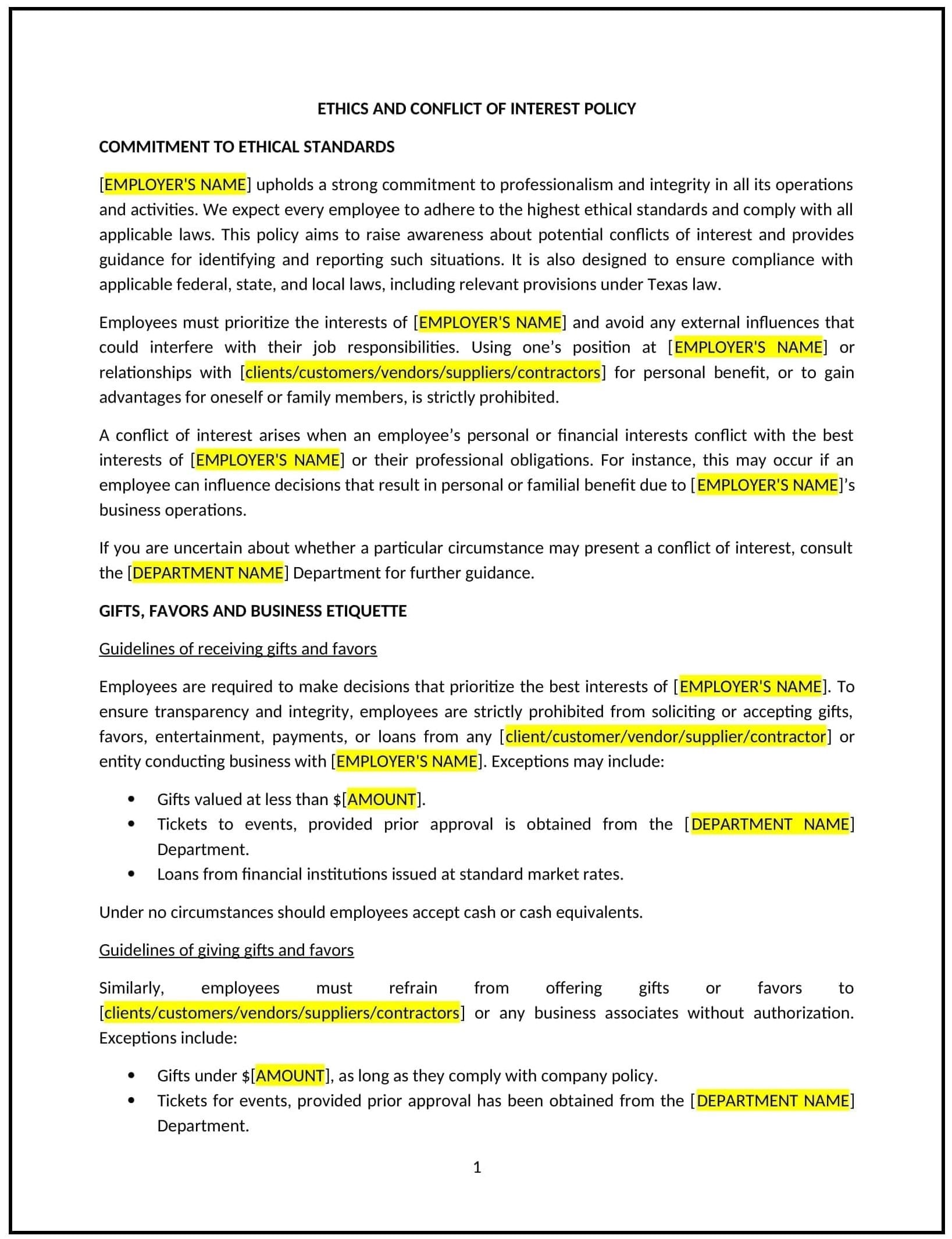Ethics and conflict of interest policy (Texas): Free template
Got contracts to review? While you're here for policies, let Cobrief make contract review effortless—start your free review now.

Customize this template for free
Ethics and conflict of interest policy (Texas)
This ethics and conflict of interest policy is designed to help Texas businesses establish clear guidelines for ensuring ethical conduct and preventing conflicts of interest within the workplace. Whether businesses are managing relationships with clients, vendors, or employees, this policy provides a structured approach to identifying and addressing conflicts of interest, ensuring that business decisions are made in the best interest of the company.
By adopting this policy, businesses can promote transparency, integrity, and accountability, while maintaining a strong reputation and compliance with both Texas state laws and federal regulations.
How to use this ethics and conflict of interest policy (Texas)
- Define conflict of interest: Clearly explain what constitutes a conflict of interest, including situations where employees, officers, or directors have personal or financial interests that may interfere with their professional duties or decisions.
- Set disclosure requirements: Outline the process by which employees, officers, and directors must disclose any potential conflicts of interest, including financial interests, family relationships, or outside business activities that could influence their judgment.
- Establish approval procedures: Specify the steps for evaluating and addressing disclosed conflicts of interest, including how conflicts will be reviewed, who will be involved in the decision-making process, and what actions may be required to resolve the conflict.
- Address ethical behavior: Define the ethical standards expected of employees, including honesty, transparency, respect for others, and compliance with laws and company policies.
- Set consequences for violations: Clearly outline the consequences of failing to disclose a conflict of interest or engaging in unethical behavior, which may include disciplinary action or termination, depending on the severity of the violation.
Benefits of using this ethics and conflict of interest policy (Texas)
This policy offers several benefits for Texas businesses:
- Promotes ethical conduct: A clear ethics and conflict of interest policy helps employees understand the importance of ethical behavior and decision-making, fostering a culture of integrity within the company.
- Reduces legal risks: By addressing potential conflicts of interest and ethical violations proactively, businesses can reduce the risk of legal challenges, penalties, or reputational damage resulting from unethical practices.
- Enhances transparency and trust: A transparent approach to conflict of interest and ethical standards builds trust with employees, clients, and stakeholders, demonstrating that the business is committed to making decisions in the best interest of all parties.
- Supports compliance: The policy helps businesses comply with Texas state laws, federal regulations, and industry standards related to conflicts of interest, ethics, and corporate governance.
- Strengthens company reputation: A commitment to ethical conduct and conflict of interest management enhances the company’s reputation as a responsible and trustworthy organization, attracting top talent and business opportunities.
Tips for using this ethics and conflict of interest policy (Texas)
- Communicate clearly: Ensure that all employees, officers, and directors are aware of the ethics and conflict of interest policy, including their responsibility to disclose potential conflicts and adhere to ethical standards.
- Provide regular training: Offer training on conflict of interest identification and ethical decision-making to ensure that employees understand how to recognize and manage conflicts in their roles.
- Maintain an open-door policy: Encourage employees to report concerns or ask for guidance regarding potential conflicts of interest, and ensure that employees feel comfortable discussing issues without fear of retaliation.
- Monitor compliance: Regularly audit business practices to identify potential conflicts of interest and ensure that employees are adhering to the policy.
- Review regularly: Update the policy periodically to reflect changes in Texas state laws, federal regulations, or business operations that may affect conflict of interest management or ethical standards.